Back from Fiji
Kurt Zion Pala is a Columban seminarian from Iligan City. Earlier this year he returned from his two-year First Mission Assignment (FMA) in Fiji. Here he is interviewed by Anne B.Gubuan, assistant editor of Misyon and Columban Mission.
What happens now after your FMA in Fiji?
I will continue my studies in theology another two years. (Editor’s note: these began last June.)Then I’ll be ordained deacon. Less than three years more. I’m getting nervous. I’m almost there. It’s more of an excitement, can’t wait to reach that stage already. Living in Fiji, I’ve seen my life as a missionary priest. That’s where my choices were affirmed.
It was tough but I was happy. Life on the missions is full of challenges that you will not really experience if you are in your own place.
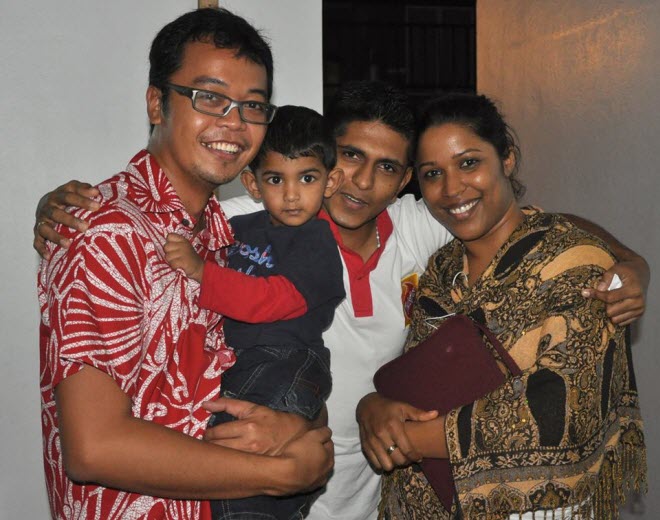
Members of the traditional Indian Mandali Catholic prayer group of which Kurt is also a member.
At first I thought I was ready for the missions. I had my spiritual year, then philosophy, then theology,not to mention all the exposure trips and the experience of being immersed in different pastoral situations. I tried ‘nibbling’ at it all in to nourish me and prepare me for the journey ahead. But right now, I can really say that nothing will prepare you for missionary life.
What is it about being new to the mission place?
Everything was strange when I first arrived in Fiji. I was like an infant. Back to zero. I had to learn everything: language, food, practices, customs and habits of the people. In order to survive in the mission field you have to be like a child: curious, open to all possibilities. I was able to somehow get over my shyness. As a ‘newbie’you would normally wait for others to initiate the conversation, but in Fiji they’re not like that, especially in the community where I lived with the Indo-Fijians. They’re different from the ethnic Fijians. They’re more conservative and reserved, especially the women. What made it even more difficult for me was the fact that they are not confident with their English so they choose to be quiet and timid. In the villages the women don’t really have higher education.
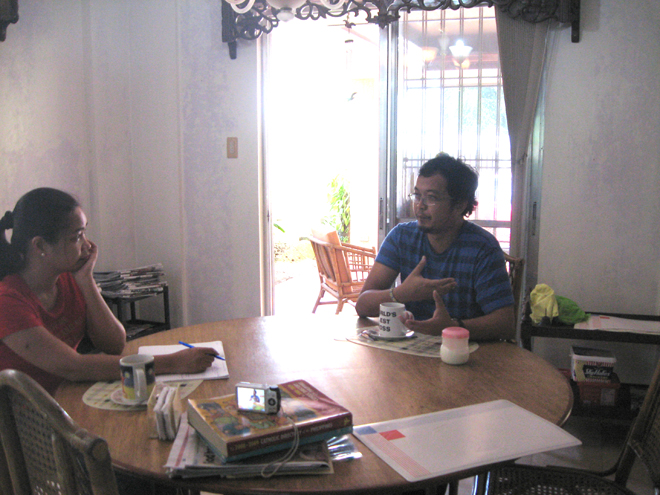
Kurt sharing his Fiji exprience.
If something is difficult but you are determined, you will learn how to do it.
And you did?
I did. I learned Hindi, the language of the Indo-Fijians. Hindi is more complicated than Fijian and uses a different script and has some different sounds. I started by learning the script and the sounds. I was like a grade one student, learning how to write the letters, the sounds of each letter and their pronunciations. As a missionary, this is where your patience is really tested. It was difficult, but not impossible. So anyone can certainly become a missionary.
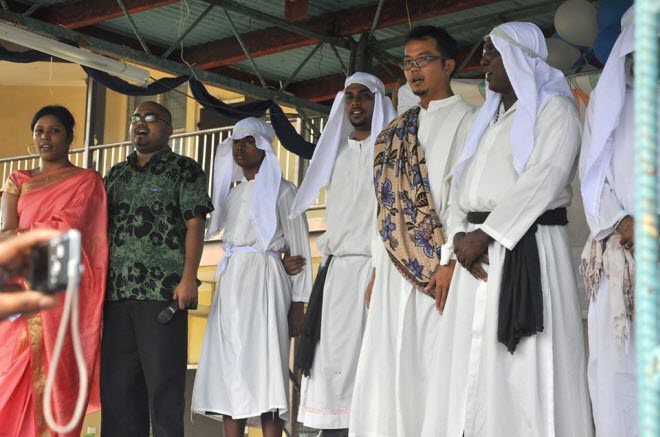
Kurt participating in his first Dharamsamellan or gathering of all Indian Catholics in Fiji.
It is very encouraging to hear you say that because usually going to a new place, not to mention faraway, entails hardships and difficulties. There are fears too of the unknown. Many would like to become missionaries but are afraid to go.
You really have to be adventurous. You shouldn’t be afraid to take risks or make mistakes because that’s how you’ll learn.
You heard the story when I missed my flight from Hong Kong to Nandi? I was alone and unprepared. It was good that I got the number of Fr Eamon Sheridan, then on the Columban General Council in Hong Kong.So I contacted him immediately. He thought I was making a bit of a courtesy call when in fact it was a call for help.
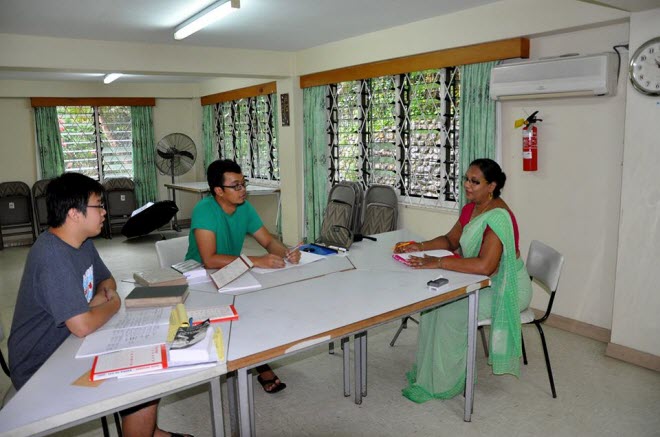
Kurt attending a session with their “Hindi” language teacher Tara.
That’s when I was able to conclude that indeed mission is for everyone. We all have it in us to surpass each obstacle or trial along the way. Mission comes from our baptism. It’s not just a simple blessing from the priest, but already a call. And out of gratitude for being called to be part of God’s family, we respond by proclaiming about Christ, about the gospel and sharing it with others. So if we only understand our baptism in that way, we wouldn’t be afraid of being missionaries.
But back in Fiji there were times when I would really find things too difficult and would just find myself asking questions like, ‘Why am I here? What am I doing here? Why am I forcing myself into a culture so different from my own? Why bother bringing myself into this situation when I could have done mission in my own country?’
So you reached that stage when you wanted to go home?
Yes I reached that stage. But what encouraged me was the people themselves. One of the hardest times for me was when I got dengue fever. I spent five days in the local hospital. I was there in the ward and it was very difficult, there was no privacy. I could hardly rest. I was lying there alongside Fijian and Indian patients.
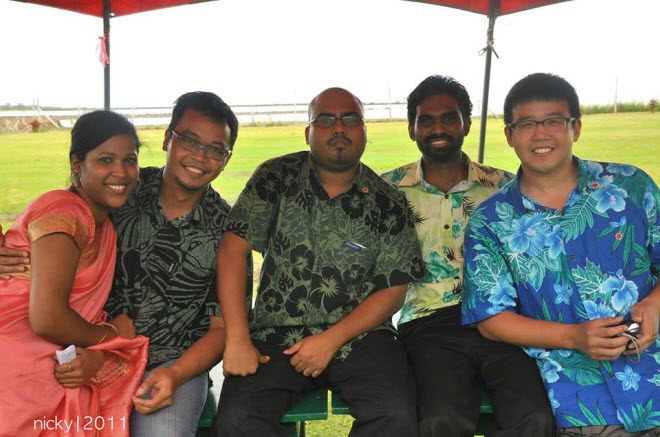
Kurt with friends at the Dharamsamellan or gathering of Indian Catholics in Fiji.
But that’s when I was able to practice my language. The others there were surprised that there was a foreigner among them who could speak their language. Indeed it was hard to be sick and alone in a foreign country but that’s where I realized I wasn’t actually alone. On my second day at the hospital I was visited by a Korean, three religious sisters, one Fijian, one Indo-Fijian and one Tongan and by lay missionary from Peru. We were like a United Nations forum.
God provided me with people to take care of me. I experienced their genuine concern. They told me they understood what I was going through and assured me, ‘Don’t worry, even if your family isn’t here, you can always consider us your family’. I was just new to their community but that’s already how they had accepted me there.
If you are determined in your mission, God will grant you the grace to face whatever challenges you may encounter along the way. That was where my decision to be a missionary priest was really affirmed.
In the community where you lived, is it a Christian community?
No. Ethnic Fijians are Christians but the majority are Methodist, not Catholic. In the Indian community the majority are Hindus, and then next to that are Muslims. The least in number are Christians. The ancestors of the Indian Catholics were Catholics when they arrived from India. In Fiji they preserved their culture and religion. The area around Naleba is mostly sugarcane fields and the majority of Indo-Fijians are sugarcane cutters. They are considered Fijians but you can hear them say ‘We’re not full Fijians’. There is quite a contrast as far as their real status is concerned. The Indians work really hard cutting cane. Ethnic Fijians can own property but Indo-Fijians cannot. They can buy only limited piece of crown land or freehold. And the farmlands are all leased. It made me think of our hacienderos here in the Philippines.
So I tried to blend with this inter-cultural community and didn’t limit myself to spending time only with the Catholics. I tried my best to visit all. I would get invited by Hindus to a festival andnext day would receive a similar invitation from the Muslims. Then Easter would follow. I really experienced the diversity of their cultures. But in spite of this diversity I experienced unity in the community. For example, when a Muslim died the grieving family would invite their Hindu and Catholic friends. And they would take turns in leading prayers. That’s one of the things that encouraged me in Fiji.
You can find Kurt Zion Pala on Facebook.
